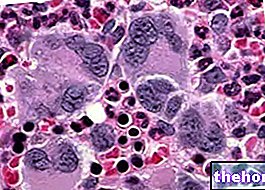, kidneys, gastrointestinal tract, nervous system and dermis) and is usually less severe than systemic (diffuse) forms. For example, amyloidosis can only affect the skin, causing discoloration and / or itching. A particular type of amyloid protein has also been found in the brains of patients with Alzheimer's disease. Localized amyloidosis is typical of senescence and affected patients. from type 2 diabetes (where the protein builds up in the pancreas). In systemic amyloidosis, fibrillar deposits are widespread and can compromise the function of many tissues and organs in the body. The causes are different, but, in general, a "neoplastic, inflammatory, genetic or iatrogenic origin is recognized." Systemic amyloidosis is often very serious: it commonly damages the heart, kidneys, intestines and nerves, causing progressive organ failure.





.jpg)






















